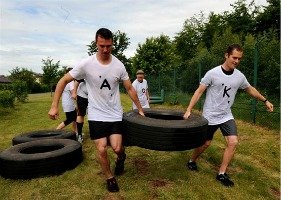Everyday life requires teamwork. As family members, we rely on each other and work together as a team. In our careers, we may manage a team or be an integral part of a team project. At school, in sports, and as members of any group or organization, effective teamwork gets the job done.
Companies who value the team relationship are likely to invest in team building activities to improve performance and productivity. But do these activities really help? According to Business Insider, the answer is yes.
Successful business owners and corporate managers know the value in keeping employees engaged and in touch with one another. Keeping the lines of communication open is critical to any successful endeavor. In order to be productive, teams must aim to get things right the first time. By engaging in team building activities where things go awry helps team members hone their skills, and get the details right to finish the game or activity.
In the workplace, effective team leaders encourage staff learn from each other, and to expect the best from one another. Nobody has all the answers, self-reliance only gets you so far. A team with an even playing field provides a relaxing environment where people are more open to share ideas and choose the best method to get a job done, or resolve a conflict that they may face along the way.
Here are a few factors to consider in maintaining a strong team:
1. Emphatic Understanding
Effective communication is always a key ingredient in team productivity. Team building activities that focus on communication facilitate staff in understanding one another. The empathic approach is essential. It’s much easier to work with someone if you walk in her shoes. It’s not how you think, it’s how your colleague thinks.
2. Trust
Exercises in team building that build trust also promote team bonding. When people exchange ideas and experience success together, they feel more confident working as a team vs. going it alone. A trustful work environment is a happy work environment, where people feel free to engage ideas and rely on one another.
3. Conflict
Conflicts arise in any human interaction, and that’s no different on the job. At work, there’s little time or tolerance for extensive conflict. Training games in conflict resolution can help teams have fun when facing strife, and build skills to fix real-life problems on the job that bring no joy. Managers who seek to end conflict professionally and quickly, know the value of humor in bonding teams and moving on.
Keep it fun.
